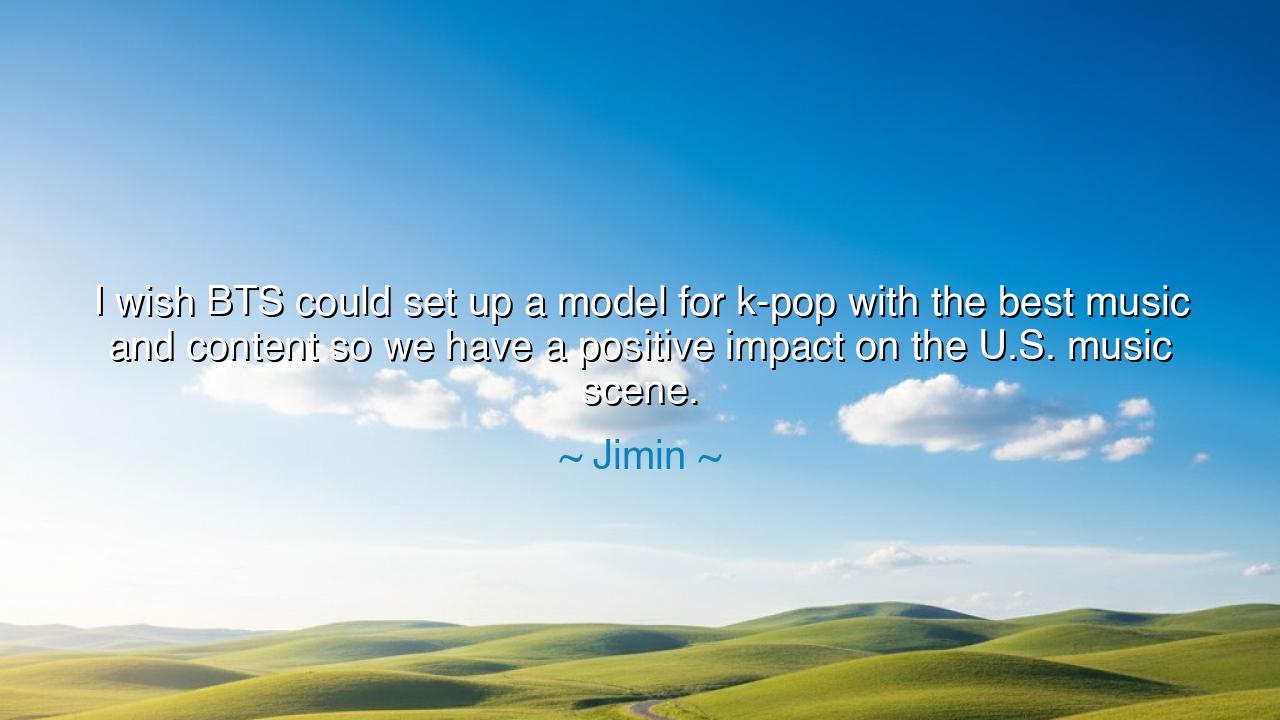
I wish BTS could set up a model for k-pop with the best music
I wish BTS could set up a model for k-pop with the best music and content so we have a positive impact on the U.S. music scene.






The words of Jimin—“I wish BTS could set up a model for k-pop with the best music and content so we have a positive impact on the U.S. music scene.”—are not only the aspirations of an artist, but the vision of one who seeks to carry his culture across oceans and generations. In this statement lies both humility and ambition: the desire not simply to succeed for oneself, but to build a model, a standard, that will inspire others. Jimin speaks as one who knows that music is more than sound—it is influence, identity, and the weaving together of peoples from distant lands.
The ancients often spoke of bridges—not of stone, but of spirit. Music has always been such a bridge, connecting hearts where politics and language divide. From the Greek lyre to the African drum, from the chants of monks to the ballads of wandering poets, song has carried culture farther than armies could march. In Jimin’s vision, BTS stands as a bridge between K-pop and the U.S. music scene, not to conquer, but to positively impact—to enrich, to inspire, to show what beauty can arise when worlds converge.
History bears witness to similar transformations. When jazz was born in the streets of New Orleans, many dismissed it as noise, yet it carried the heartbeat of African traditions and Western harmonies into something entirely new. Soon, jazz traveled across oceans, reshaping the music of Europe and beyond. So too did the Beatles, who drew upon American rock and blues, then returned across the Atlantic to ignite a revolution that forever altered global sound. Jimin’s words echo this same cycle of cultural exchange: that through dedication to the best music and content, K-pop can leave its indelible mark on the world.
But Jimin’s wish is not for fame alone. It is for responsibility. He understands that to be a model is to be watched, imitated, and measured. This is why he longs for BTS to represent not only popularity, but excellence—quality of music, depth of content, and a positive impact upon those who listen. For in a world where art can either heal or harm, to choose positivity is to wield power with wisdom. His words remind us that culture is not neutral—it shapes values, emotions, and the very identity of future generations.
In truth, this is a heroic task. To alter the course of an entire industry is akin to moving a mountain. Yet history tells us it can be done. Consider Motown, which in the 1960s brought Black artists into the mainstream of American music, changing forever the cultural landscape and opening doors once closed. Through discipline, vision, and unity, they became not just entertainers but architects of social progress. In the same spirit, BTS and Jimin seek not only to achieve personal triumph, but to set a path for others to follow, ensuring that K-pop is remembered not as a passing trend, but as a force of lasting significance.
The lesson is clear: whatever your field—whether in art, science, leadership, or service—do not strive merely for your own success. Strive to become a model, to set a standard that uplifts those who will come after you. Let your work not only bring recognition, but also positive impact upon the wider world. Ask yourself, as Jimin does: how can what I create, what I do, what I build, enrich the lives of others?
So, dear listener, take these words as both challenge and encouragement. In your own life, pursue excellence, but also responsibility. Seek to build bridges, not walls; to share your gifts in ways that inspire; to shape not only your destiny, but the destiny of your community. For as Jimin reminds us, greatness is not only measured in applause, but in the legacy we leave behind—the model we set for others, the good we sow into the world through our art, our labor, and our love.






NV38. Nguyen Thi Ngoc van
This raises an interesting tension between ambition and expectation. While striving to positively impact U.S. music is admirable, could it create undue pressure on BTS to constantly perform at a global standard? I also wonder how fans perceive this responsibility—do they see it as inspiring or burdensome? Could BTS’ approach inspire collaboration between Western and K-pop artists in a way that elevates both industries, rather than placing the weight solely on one group?
PAphan alina
Reading this, I feel curious about the challenges of cultural crossover. How much influence can BTS realistically have in shaping the U.S. music scene when cultural preferences and industry standards differ? Could aiming to set a model risk compromising their originality to appeal to Western audiences? I also wonder whether other international artists face similar pressures to serve as cultural ambassadors, and how that affects their music and identity.
SNSon Nguyen
I find this perspective intriguing because it shows BTS’ awareness of their impact. Could establishing a positive model in the U.S. music scene help break stereotypes about K-pop being purely manufactured or commercialized? I also wonder what specific strategies or approaches could make this model effective. Is it about music quality, content creation, fan engagement, or a combination of all these elements? How might other K-pop groups follow their lead?
PTNguyen Phi Thieu
This makes me think about the influence of K-pop beyond music—how cultural exchange shapes global trends. Can BTS realistically set a standard that balances artistic excellence with commercial appeal in the U.S.? I also wonder how the pressure to act as a cultural model affects their creative freedom. Is it fair to expect one group to represent an entire genre internationally, or is this more about public perception than actual responsibility?